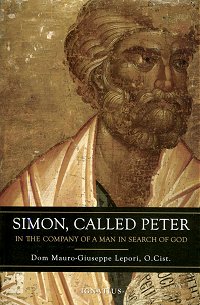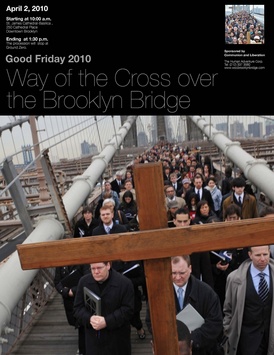Communion & Liberation: March 2010 Archives
No Catholic should be surprised that there is filth in the Church for Our Lord Himself told us that this would be so in the parable of the weeds among the wheat (Matthew 13:24-30). AND it's no surprise that the Church is full of sinners, sinners who commit grave sin. And yes, some who claim to follow Christ commit evil and everything possible must be done to stem the evil and to make amends for that pain generated by that evil.
Furthermore, no Catholic should be surprised that the Faith should once again be attacked during Easter because this is an annual event. However, this year's annual Easter attack on the Faith has taken the form of one upon the person of the Pope, Benedict XVI, himself.
What truly saddens me, however, is that there are many within the Church herself, those who should know better, that are once again attempting to create a Christianity without Christ. But if we forget Christ, if we do away with the wholly different measure that He introduces into the world now, through the Church, then we no longer have the terms on which to judge the Church.

Ignatius Press recently published a new book on Saint Peter called, Simon, Called Peter: In the Company of a Man in Search of God by a Cistercian Abbot with roots in Communion and Liberation, Dom Mauro-Giuseppe Lepori, O.Cist.
Dom Mauro-Giuseppe Lepori, O.Cist. writes of his book: "At every stage of my life as a man, a Christian, a monk, an abbot, I have found Saint Peter to be a companion to walk ahead of me... Peter is the Gospel saint who is more 'us' than any other, closer to our own humanity, yet so close to Christ. Peter is the one we can always follow."
What others have said
You are carried into the events narrated here... and you see them with your own eyes and heart, more than if you had been there.
from the Foreword by Cardinal Angelo Scola, Patriarch of Venice
Dom Lepori's account of Peter reminds us of just how often this first of the Apostles appears in the Gospels. When we see Peter spelled out in his encounters with Christ, we realize that this 'Rock' is being formed, but also that he was someone who could be formed. It is not without interest that the Church is founded on Peter, a solid man, yet also a sinner. With Lepori's guidance, we realize that Peter's life is a portrait of how God deals with men. We cannot but be moved by this Peter, a man like unto us, sin included, but a brave man who acknowledges, who learns, who, in the end, is 'the Rock' that he was called to be from the first time Christ saw him.
James V. Schall, SJ, Author, The Order of Things
About the author
Dom Mauro-Giuseppe Lepori, O. Cist., is the abbot
of the Cistercian Abbey of Hauterive outside of Fribourg, Switzerland. He
received his licentiate in philosophy and theology from the Catholic University
of Fribourg and as a layman was an active member of Communion and Liberation.
In 1984, he entered the Abbey of Hauterive and ten years later was elected
abbot. Written originally in Italian, Simon Called Peter has been translated
into both French and German. Other works by Lepori include L'amato presente.
An interview with Dom Mauro-Giuseppe at the Rimini Meeting.
A brief essay by Dom Mauro called "The Re-Creation Brought about by Christ," published in Traces.

Around the world in past 2 weeks Communion and Liberation's Schools of Community have been praying for the good of Communion and Liberation while remembering the 5th anniversary of death of Monsignor Luigi Giussani. In the Archdiocese of Ottawa last Monday (February 22) Archbishop Terrence Prendergast, SJ celebrated Mass for CL-Ottawa and here is a portion of his homily. One of the touching points in His Grace's homily is the phrase, "to follow Christ." The same phrase I used for my coat of arms; see above.
Five years ago today, Don Luigi Giussani, the founder of a movement that came to be known as Communion and Liberation was called home to God by the Lord Jesus Christ. Cardinal Ratzinger, our present pope was sent by Pope John Paul II as his legate to the funeral ceremony in Milan. On that occasion, he testified to the way in which Don Giussani had allowed himself to be led by Christ in a loving relationship from his earliest years, just as Peter had from the moment of his first encounter with Jesus: "This love affair with Christ, this love story which is the whole of his life, was however far from every superficial enthusiasm, from every vague romanticism. Really seeing Christ, he knew that to encounter Christ means to follow Christ. This encounter is a road, a journey, a journey that passes also-as we heard in the psalm-through the 'valley of darkness.' In the Gospel, we heard of the last darkness of Christ's suffering, of the apparent absence of God, when the world's Sun was eclipsed. He knew that to follow is to pass through a 'valley of darkness,' to take the way of the cross, and to live all the same in true joy."
St. Francis Xavier expressed this in a lovely poem, "O Deus, Ego Amo Te," translated touchingly by his brother Jesuit, the poet Gerard Manley Hopkins:
O GOD, I love thee, I love thee-
Not out of hope of heaven for me
Nor fearing not to love and be
In the everlasting burning.
Thou, thou, my Jesus, after me
Didst reach thine arms out dying,
For my sake sufferedst nails, and lance,
Mocked and marred countenance,
Sorrows passing number,
Sweat and care and cumber,
Yea and death, and this for me,
And thou couldst see me sinning:
Then I, why should not I love thee,
Jesu, so much in love with me?
Not for heaven's sake;
not to be out of hell by loving thee;
Not for any gains I see;
But just the way that thou didst me
I do love and I will love thee:
What must I love thee, Lord, for then?
For being my king and God. Amen.

